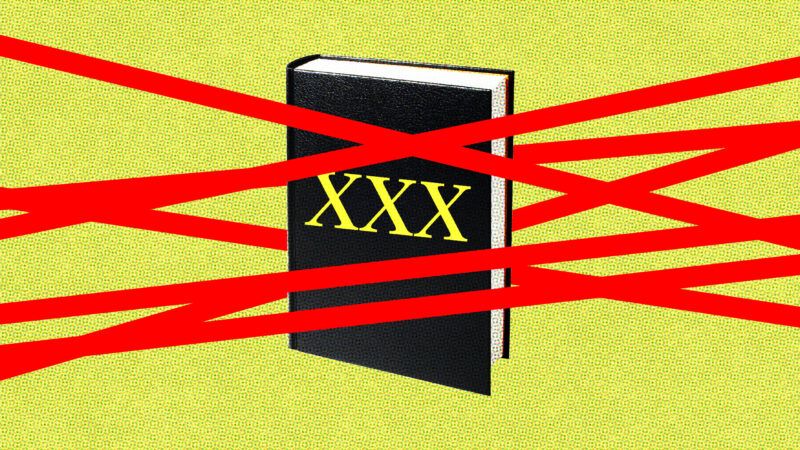North Dakota Legislators Consider Bill To Ban 'Sexually Explicit' Material From Public Libraries
"If you don't like a book, don't read it. The First Amendment's guarantee of the freedom of speech and the right to access information has created a beautiful marketplace of ideas in our country," said one ACLU representative opposing the bill.

On Tuesday, legislators in North Dakota began considering a bill that would ban "sexually explicit" material from public libraries in the state—and levy up to 30 days of imprisonment for those who refuse to comply with the law. The bill has already drawn the ire of civil liberties groups, who point out its blatantly unconstitutional provisions. If passed, the bill would ban broad swaths of literature—though almost none of it could be considered legally obscene.
"Nearly 50 years ago, the Supreme Court set the high constitutional bar that defines obscenity—a narrow, well-defined category of unprotected speech that excludes any work with serious literary, artistic, political or scientific value," reads a press release from the American Civil Liberties Union (ACLU) of North Dakota. "Since then, few if any books have been deemed obscene."
The bill was introduced last week by House Majority Leader Mike Lefor (R–Dickinson.) If passed, the bill would ban any "business establishment frequented by minors, or where minors are or may be invited as a part of the general public," including public walkways, from displaying any visual material "which exploits, is devoted to, or is principally made up of depictions of nude or partially denuded human figures posed or presented in a manner to exploit sex, lust, or perversion for commercial gain." Further, the bill provides a list of acts and ideas that it considers "sexually explicit"—a list which includes "sexual identity," "gender identity," and perhaps most confusingly, "sex-based classifications."
It provides exceptions for "works of art that, when taken as a whole, have serious artistic significance, or works of anthropological significance, or materials used in science courses, including materials used in biology, anatomy, physiology, or sexual education classes." Further, in an unusual departure from similar book-banning pushes, the proposed law explicitly exempts any "school" from the law, meaning that school libraries will still be able to provide banned materials.
Though the bill applies to a broad range of locations, it seems to have been explicitly created to ban certain "sexually explicit" books from public libraries. On Tuesday, Lefor told The Bismarck Tribune that he drafted the bill after seeing nude drawings in the graphic novel Let's Talk About It: The Teen's Guide to Sex, Relationships, and Being a Human. "I think the content of it is disgusting, that at the very least, public libraries should put it in a restricted area where [children] need to get permission from their parents to take a book out like this," Lefor said. "This is not a way to raise our kids, and we have to do everything we can to make sure that this doesn't get into the hands of children, especially without their parents' knowledge."
Legislators began formally considering the legislation on Tuesday. According to KFYR, a local news station, 63 of the 73 pieces of testimony submitted to the bill's committee were in opposition to the bill.
"Why does the North Dakota Public Library, funded with taxpayer dollars, need to purchase and promote obscene and pornographic material? What is the social redeeming value in doing that? How does that make our state better?" testified one resident.
In opposition, Cody Schuler, an advocacy manager with the ACLU of North Dakota, said, "Each of us gets to choose what books we read and what information we access. But we don't get to choose that for other people. Doing so is un-American and unconstitutional."
As Schuler notes, the bill is blatantly unconstitutional. The Supreme Court has long held a very strict definition of obscenity—one that clearly conflicts with the ban proposed by Lefor's bill. In the 1973 case Miller v. California, the Supreme Court defined material as legally obscene if "(1) the average person, applying contemporary community standards, would find that the work, taken as a whole, appeals to the prurient interest; (2) the work depicts or describes, in a patently offensive way, sexual conduct specifically defined by the applicable state law; and (3) the work, taken as a whole, lacks serious literary, artistic, political, or scientific value."
However, much of what would be banned by Lefor's bill does not meet this definition—not only would the graphic novels and sex education books that seem to be the target of the bill be constitutionally protected but so too would other expression targeted by the law—like depictions of gay or transgender people, which might be banned for showing "sexual" or "gender identity."
"There are some books you will think children shouldn't read and some books that you hope no one will read. But we are steadfast in our belief that we do not get to decide what others read – and neither should the government," Schuler said in the ACLU press release. "If you don't like a book, don't read it. The First Amendment's guarantee of the freedom of speech and the right to access information has created a beautiful marketplace of ideas in our country."

Show Comments (96)